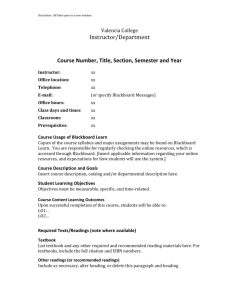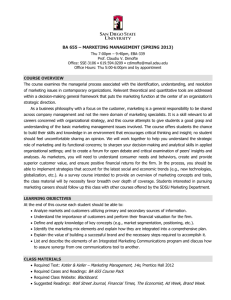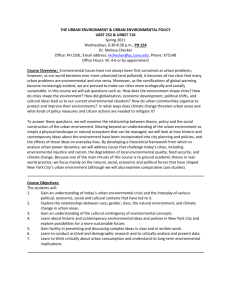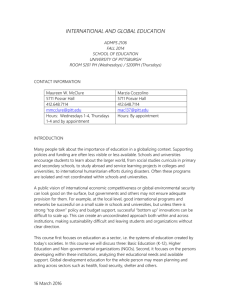C30.0011 Economics of Global Business
advertisement
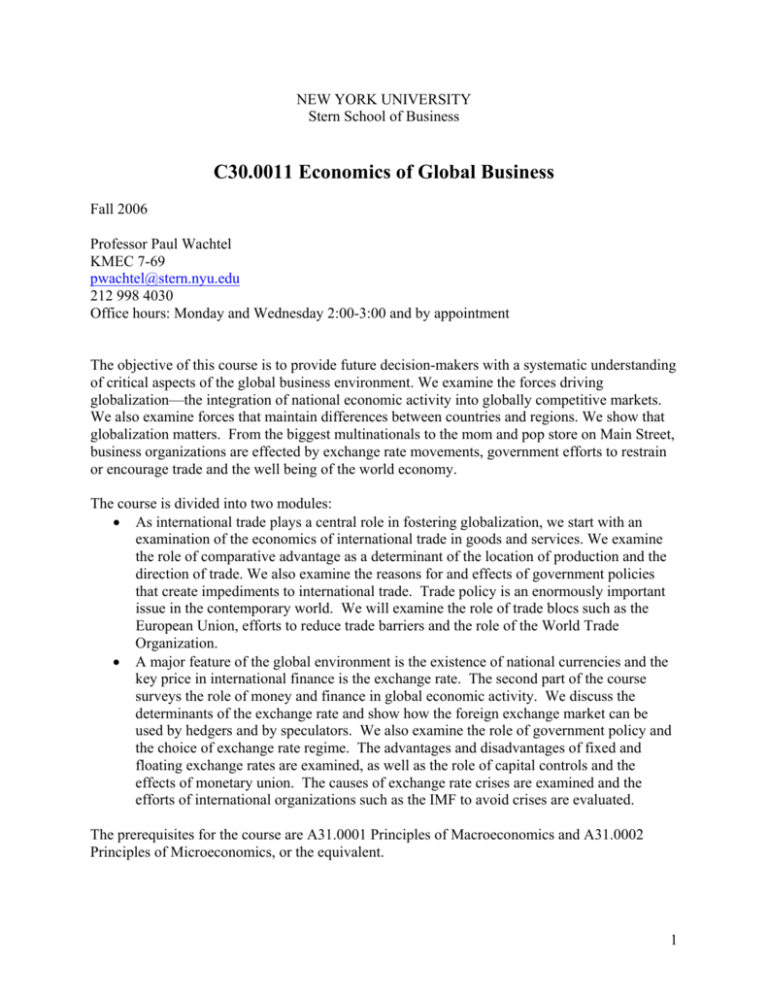
NEW YORK UNIVERSITY Stern School of Business C30.0011 Economics of Global Business Fall 2006 Professor Paul Wachtel KMEC 7-69 pwachtel@stern.nyu.edu 212 998 4030 Office hours: Monday and Wednesday 2:00-3:00 and by appointment The objective of this course is to provide future decision-makers with a systematic understanding of critical aspects of the global business environment. We examine the forces driving globalization—the integration of national economic activity into globally competitive markets. We also examine forces that maintain differences between countries and regions. We show that globalization matters. From the biggest multinationals to the mom and pop store on Main Street, business organizations are effected by exchange rate movements, government efforts to restrain or encourage trade and the well being of the world economy. The course is divided into two modules: • As international trade plays a central role in fostering globalization, we start with an examination of the economics of international trade in goods and services. We examine the role of comparative advantage as a determinant of the location of production and the direction of trade. We also examine the reasons for and effects of government policies that create impediments to international trade. Trade policy is an enormously important issue in the contemporary world. We will examine the role of trade blocs such as the European Union, efforts to reduce trade barriers and the role of the World Trade Organization. • A major feature of the global environment is the existence of national currencies and the key price in international finance is the exchange rate. The second part of the course surveys the role of money and finance in global economic activity. We discuss the determinants of the exchange rate and show how the foreign exchange market can be used by hedgers and by speculators. We also examine the role of government policy and the choice of exchange rate regime. The advantages and disadvantages of fixed and floating exchange rates are examined, as well as the role of capital controls and the effects of monetary union. The causes of exchange rate crises are examined and the efforts of international organizations such as the IMF to avoid crises are evaluated. The prerequisites for the course are A31.0001 Principles of Macroeconomics and A31.0002 Principles of Microeconomics, or the equivalent. 1 COURSE MATERIALS Thomas Pugel. International Economics, 13th edition, McGraw-Hill Irwin, 2007. (Abbreviated TP) Students with the 12th edition will be able to manage satisfactorily but they should carefully compare the chapter contents for each assignment or consult the TA. Pietra Rivoli. The Travels of a T-shirt in the Global Economy: an Economist Examines the Markets, Power, and Politics of World Trade, Paperback edition, 2006. Every student should keep up with current developments in the international business environment by regularly reading the financial press. You should be a regular reader of one of the following -- Financial Times, Wall Street Journal, or Economist. Additional articles and readings that will be made available on Blackboard BLACKBOARD The Blackboard site will be an important resource for the class and you should check the announcements on the site every few days. All class handouts – including lecture slides, assignments, problem sets, answers, etc. will be on the site. Supplementary readings will be on Blackboard as files or as links. Updates and revisions to the course outline will be on Blackboard. TEACHING APPROACH The most important personality characteristic that you will need in your career in the new global economy is the ability to continuously learn new skills and techniques. With this in mind, the course design relies on your ability to learn on your own. We will not try to teach everything in international economic but instead attempt to guide you as you learn it by yourself. In order for this process to succeed, it is essential that you keep up with the assigned reading. The class discussion will focus on the concepts that are most challenging and will reinforce and extend what is in the readings. From time to time, I will announce (in class and via email) that there will be a class discussion on a specific reading or article that will be made available. When a discussion is announced, I will feel free to call on students at random and I will expect everyone to be present and to be prepared to participate. It is important to develop the ability to use and apply the concepts and the best way to do this is to practice actively outside of class. Homework assignments / problem sets will be assigned and collected. You are expected to do them and to submit them on the due date. When appropriate, answers will be posted on the Blackboard site. 2 Finally, we should all be aware of our responsibilities to the class and to each other. Specifically, • As a teacher, I have the responsibility to organize and present the material in a way that facilitates your learning. I will try my best to make this happen. • As a student, you have a responsibility to facilitate learning by keeping up with all reading assignments and class activities. Further, students are expected to attend class and to be prepared for class. • No lying, cheating or plagiarism will be tolerated. Any suspected violations will be immediately referred to the Stern discipline committee. • I will make every effort to begin classes on time and end on time as well. Thus, I expect you to arrive on time since late arrivals are very disruptive. • Any action in the classroom that has a negative effect on others or on the learning environment will not be tolerated. If you have a qualified disability and will require academic accommodation during this course, please contact the Moses Center for Students with Disabilities and provide me with a letter from them verifying your registration and outlining the accommodations they recommend TEACHING ASSISTANTS Questions about class materials, assignments, etc. should be directed to one of the teaching assistants. In addition the assistants will have office hours that will be posted on Blackboard and will also be available by appointment. There will be a teaching assistant with primary responsibility for each class but all students can attend office hours and pose questions to either assistant (in English or Italian). Fall 2006 teaching assistants are: Giulio Recchia gr650@stern.nyu.edu David Meir Sasson ds1828@stern.nyu.edu GRADING The course grade will be based on the following items: First exam Second exam Final exam Country Report Class participation Homework assignments 25% 25% 25% 15% 5% 5% There is a recommended grading distribution, which will serve as a guideline for the course (30% A and A-, 50% B+, B and B-, and 20% C+ and below). 3 KEY DATES Class will NOT be held on Monday Oct. 2 and Monday Oct. 9. CLASS DISCUSSION – Sept. 18 – Discussion of The Travels of a T-shirt in the Global Economy Read the book and be prepared to participate in the discussion HOMEWORK ASSIGNMENTS (tentative schedule) #1 Globalization and international linkages – Sept. 27 #2 Comparative advantage – Oct. 11 #3 Trade policy – Oct. 30 #4 Exchange rates and balance of payments – Nov. 15 COUNTRY REPORT Groups and topic selection – October 30 Papers due – December 4 Presentations – December 4 and 6 EXAMS Exam I – October 18 Exam II – November 20 Final Exam - Friday, December 15, 2:00 – 3:50 PM - This is not a regular class session; it is a common exam time for all EGB sections. However, it is not a common exam. Location for the final will be announced. Let me know if the late Friday afternoon timing of the exam poses a problem for you. 4 August 29, 2006 C30.0011 Economics of Global Business Course Outline (Additional readings will be posted on Blackboard) 1. Introduction: Globalization, growth and international linkages • Trends in globalization • International linkages and the current account READINGS: TP chapter 1 Ben S. Bernanke, Global Economic Integration: What's New and What's Not? Remarks at the Federal Reserve Bank of Kansas City's Thirtieth Annual Economic Symposium, Jackson Hole, Wyoming, August 25, 2006 Dani Rodrik, Sense and Nonsense in the Globalization Debate. Globalization: The Story Behind the Numbers, IMF Finance & Development, March 2002. M. Higgins and T. Klitgaard, Viewing the Current Account Deficit as a Capital Inflow, NY Fed, Dec. 1998. 2. Why do countries trade? • Gains from trade – absolute and comparative advantage • Technology and productivity differences: Ricardo • Factor or resource availability: Hecksher-Ohlin • Effects of trade • Patterns of trade • Modern trade theories READINGS TP chapters 3 to 7 3. Trade policy • Protectionism: Tariffs, quotas and other non-tariff barriers • Effects of protection • Export subsidies • Are there arguments for protectionist policies? • Dumping and antidumping duties • International trade institutions: principles and activities of the WTO • Regional trade blocs, free trade areas, customs unions, etc. • Foreign Direct Investment READINGS TP chapters 7 to 12 and 14 to 15 Edward Gresser, Toughest on the Poor: America’s Flawed Tariff System The Truck Stops Here, WSJ editorial WSJ articles on Chinese furniture dumping case 5 4. Balance of payments and macroeconomic policy • Balance of payments – trade and capital flows • Current account, debt and capital flows • Monetary policy, fiscal policy and the current account READINGS TP chapter 16 5. Exchange rates • Foreign exchange markets • Real and nominal exchange rates • Forward markets, hedging and speculation • Financial markets and exchange rates • Exchange rates and inflation • Determinants of exchange rates READINGS TP chapters 17-19 Economist, McCurrencies 6. Government policy and exchange rate regimes • Fixed, floating and others • History: Gold standard, the Bretton Woods system • Exchange rate system today • European monetary union and the Euro • Role of International Monetary Fund • International lending and debt • Exchange rate crises READINGS TP chapters 20, 21 and 25 6

